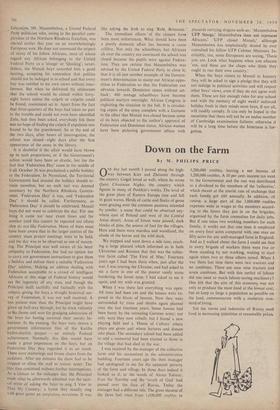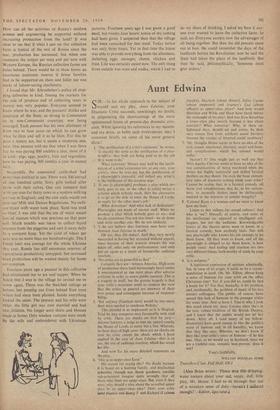Down on the Farm
By M. PHILIPS PRICE ONE day last month 1 passed along the high- way between Kiev and Zhitomir through the country Gogol loved so well; where be wrote Quiet Ukrainian Nights, the country which figures in many of Pushkin's works. The level of the great plain of Eastern Europe rose and fell in giant waves. Herds of cattle and flocks of geese were grazing over the common pastures attended by youths: a scene that could be observed any- where east of Poland and west of the Central Asian desert. Areas of forest were passed, dark blocks of pine, the source of fuel for the villages. Here and there were marshes and woodland, the abode of the heron and the wild duck, We stopped and went down a side lane, reach- ing a large placard which informed us in both Ukrainian and Russian that this was the collec- tive farm called 'The First of May.' Fourteen years ago I had been there when, just after the war, I was touring the Ukraine; and had asked to see a farm in one of the poorer sandy areas bordering the forest zone. I had asked to see it again, and my wish was granted.
When I was there last everything was open. All trees had been cut and the houses were ex- posed to the blasts of heaven. Now they were surrounded by trees and shrubs again planted over the last fourteen years. Some houses had been burnt by the retreating German army; not only were they now rebuilt, but I found a new playing field and a 'House of Culture' where plays are given and where lectures and dances lake place. The secondary school had been added to and a memorial had been erected to those in the village that had died in the war.
I was received by the manager of the collective farm and his accountant in the administrative building. Fourteen years ago the then manager had apologised to me for the apparent poverty of the farm and village. In those days indeed it looked as if, in the words of Alexei Tolstoy, Ivan the Terrible and the 'wrath of God' had passed over the face of. Russia. Today the manager had a different tale. The gross income of the farm had risen from 1,000,000 roubles to 4,200,000 roubles, leaving a net income of 1,200,000 roubles. A 10 per cent. income tax went to the Government and the rest was distributed as a dividend to the members of the 'collective,' which meant at the tourist rate of exchange that each family got £60 annually. In addition, of course, a large part of the 3,000,000 roubles expenses went in wages to the members accord- ing to the hours they put in on the brigades, organised by the farm committee for daily jobs. But if one takes two working members for each family, it works out that one man is employed on every four acres compared with one man on fifty acres for any well-managed farm in England. And as 1 walked about the farm I could see that in every brigade of workers there were two or three standing by not working, waiting to start again when two or three others rested. When I was there last time there were two tractors and no combines. There are now nine tractors and seven combines. But with this surfeit of labour did one need so much labour-saving machinery? One felt that the aim of this economy was not only to produce the most food at the lowest cost, but to keep as large a population as possible on the land, commensurate with a moderate stan- dard of living.
Yet the towns and industries of Russia need food in increasing 'quantities at reasonable prices. How can all the activities of Russia's modern science and engineering be supported without increasing production from the land? It was clear to me that if what I saw on this collective farm is typical of the rest of Russia since the war, production has increased; but when one compares the output per man and per acre with Western Europe, the Russian collective farms are miles behind. There would be in these farms an enormous economic reserve if fewer families had to be supported on them and fuller use was made of labour-saving machinery.
I found that Mr. Khrushchev's policy of stop- ping deliveries in kind, freeing the markets for the sale of produce and of collecting taxes in money was very popular. Everyone seemed to k now where he was; and the peasants' dislike and suspicion of the State, as strong in Communist as in non-Communist countries, was being assuaged. Each peasant has his own allotment of from two to four acres on which he can grow what he likes and sell it as he likes. For this he pays a money tax, but it seems a moderate one, now. One peasant told me that when I was there last he was paying 800 roubles a year, most of it in kind--pigs, eggs, poultry, fruit and vegetables; now he was paying 300 roubles a year in- money Meanwhile the communal cattle-shed had more than doubled in size. There were 300 instad of one hundred cattle. Sixty girls looked after them with their calves. One can compare that th one man for thirty cows in a modern milking pa-!our in England; and the co' stalls would not pass our Milk and Dairies Regulations. No swill- ipo down with-water took place. Sand was used litter. I was told that the use of water meant los,. of manure which was precious on that poor soil. Much trouble was 'taken to collect liquid manure from the piggeries and cart it away daily to a compost heap. Yet the yield of wheat per acre was no more than ten hundredweight. This I found later was average for the whole Ukraine this year. Russia has still enormous reserves of ztgrieultural. productivity untapped; but increased food production will be wanted mainly for home cot- su motion.
Fourteen years ago a peasant in this collective ha,i entertained me to tea and supper. When he heard that I was in the village he invited me to come again. There was the thatched cottage • as before, but peepiiig out from behind fruit trees which had since been planted. Inside everything looked the same. The peasant and his wife were older, the little girl was now married and had two children. No longer were shirts and blouses made at home. Only window curtains were made by the wife and embroidered with Ukrainian patterns. Fourteen years ago I was given a good meal, but twenty-four hours' notice of my coming had been given. I suspected then that the village had been ransacked for that meal. Today notice was only three hours. Yet in that time the house was able to provide everything from the allotment, including eggs, sausages, cheese, chicken and fruit. Life was certainly easier now. The only thing from outside was wine and vodka, which I had to
do my share of drinking. I asked my host if any- one ever wanted to leave the collective farm; he said, no. Everyone accepts now the advantages of all being together. But then the old peasant came out in him. He could remember the days of the landlords before the Revolution; now he said the State had taken the place of the landlords. But then he said, philosophically, 'Someone must give orders.'







































































 Previous page
Previous page